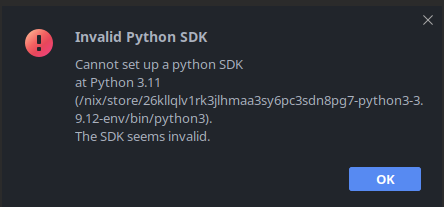I started using Nixos about two weeks ago and everything is going great except for the unstable channel. There are some programs whose versions I would like to use from unstable. For reference I used Installing only a single package from unstable.
Channels in use:
➜ ~ sudo nix-channel --list
home-manager https://github.com/nix-community/home-manager/archive/release-21.11.tar.gz
nixos https://nixos.org/channels/nixos-21.11
nixos-unstable https://nixos.org/channels/nixos-unstable
Imports:
{ config, pkgs, lib, ... }:
let
unstable = import <nixos-unstable> { config = { allowUnfree = true; }; };
in
{
imports =
[
# Include the results of the hardware scan.
./hardware-configuration.nix
<home-manager/nixos>
];
And packages:
home.packages = with pkgs; [
unstable.alacritty
unstable.wezterm
unstable.jetbrains.rider
unstable.jetbrains.idea-ultimate
unstable.jetbrains.pycharm-professional
unstable.jetbrains.clion
];
Any program that I tried to use from unstable causes some kind of problem.
Alacritty:
➜ ~ alacritty
Created log file at "/tmp/Alacritty-6123.log"
[0.001503696s] [WARN ] [alacritty_config_derive] Config warning: background_opacity is deprecated; use window.opacity instead
Deleted log file at "/tmp/Alacritty-6123.log"
Error: Error creating GL context; Received multiple errors. Errors: `[OsError("Could not create EGL display object"), OsError("`glXQueryExtensionsString` found no glX extensions")]`
Wezterm with a similar error. out is a bit longer this time. Removed the repeating errors and all sorts of warnings:
➜ ~ wezterm
libEGL warning: MESA-LOADER: failed to open iris: /nix/store/m4g6lswi75b739cpdx8wfxlfmcazyks9-glibc-2.34-115/lib/libpthread.so.0: version `GLIBC_PRIVATE' not fo
und (required by /nix/store/qjgj2642srlbr59wwdihnn66sw97ming-glibc-2.33-123/lib/librt.so.1) (search paths /run/opengl-driver/lib/dri, suffix _dri)
22:00:34.416 ERROR wezterm_gui::frontend > Failed to create window: with_egl_lib failed: with_egl_lib(libEGL.so.1) failed: egl Initialize: NOT_INITIALIZED, libEGL.so: libEGL.so: cannot open shared object file: No such file or directory, with_egl_lib(libEGL.so.1) failed: egl Initialize: NOT_INITIALIZED, libEGL.so: libEGL.so: cannot open shared object file: No such file or directory
In the case of jetbrains products. I’ve had time to test PyCharm and IntelliJ IDEA so far. From the first glance, the errors are different, but the source of the errors is the same and is visible in the out.
IntelliJ IDEA terminal. The error will not just affect the terminal, in fact the whole IDEA is tied to Gradle, so the work is simply not possible:
➜ ~ ./gradlew build
/nix/store/b7w29s922lprhvvsg259bdazxg55vqql-openjdk-17.0.3+7/lib/openjdk/bin/java: /nix/store/qjgj2642srlbr59wwdihnn66sw97ming-glibc-2.33-123/lib/libc.so.6: version `GLIBC_2.34' not found (required by /nix/store/69brclzxp7mg927k6986hrfzyd1hpqgd-gcc-11.2.0-lib/lib/libstdc++.so.6)
/nix/store/b7w29s922lprhvvsg259bdazxg55vqql-openjdk-17.0.3+7/lib/openjdk/bin/java: /nix/store/qjgj2642srlbr59wwdihnn66sw97ming-glibc-2.33-123/lib/libc.so.6: version `GLIBC_2.34' not found (required by /nix/store/69brclzxp7mg927k6986hrfzyd1hpqgd-gcc-11.2.0-lib/lib/libgcc_s.so.1)
And the end of Pycharm which throws an error if I try to specify python via system interprater. Which is also set via configuration.nix. Pycharm out:
2022-05-05 22:14:25,091 [ 14113] WARN - #c.j.p.s.f.PythonSdkFlavor - Couldn't get interpreter version: process exited with code 1
/nix/store/wq6s8i407ic4qp1dvd5yhrnd0kflzh6x-python3-3.9.12/bin/python3: /nix/store/qjgj2642srlbr59wwdihnn66sw97ming-glibc-2.33-123/lib/libc.so.6: version `GLIBC_2.34' not found (required by /nix/store/69brclzxp7mg927k6986hrfzyd1hpqgd-gcc-11.2.0-lib/lib/libgcc_s.so.1)
And:

All these problems I have observed only with Unstable packages. Stable versions work fine. Therefore, I began to think that the problem was in my configuration and did not write in an issue on github and wrote here.
In all cases, there is some kind of problem with the libraries, which I thought was not possible on this system. Thanks for all the help.